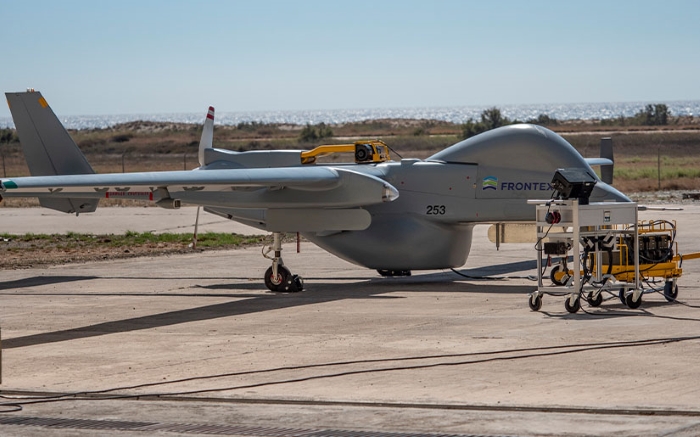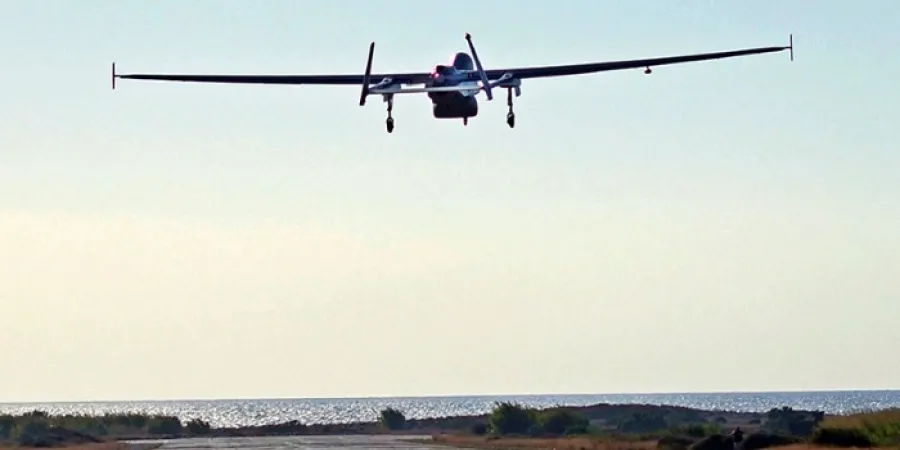IAI, Airbus win drone operation contract from EU coast guard agency
The remotely piloted aircraft systems will be used for maritime aerial surveillance to help monitor and secure the borders
IsraelDefense
|
24/10/2020
Israel Aerospace Industries (IAI) and its partner Airbus DS Airborne Solutions have been awarded a contract from Frontex, the European Border and Coast Guard Agency, to operate medium altitude, long endurance Remotely Piloted Aircraft Systems for maritime aerial surveillance operations.
The service will be delivered in Greece, and/or Italy and/or Malta within a Framework Contract. The service includes the provision of an RPAS platform, payload, communication equipment and capacity, mission storage and all necessary experts managing the system and providing operational support. Under the contract, Airbus and IAI will provide the service for pre-planned assignments as well as for ad-hoc calls, according to a press release.
The companies said that the maritime Heron RPAS serves a range of customers worldwide and is part of the Heron series which has accumulated over 450,000 flight hours, day and night, under all weather conditions. The system capable of flying more than 24 hours in full operational configuration is said to be able to provide a comprehensive, real-time picture of the situation as part of coordinated monitoring activities.
The RPAS is to be fitted with systems such as an electro-optical payload for daytime purposes and an infrared one for nighttime purposes; maritime patrol radar made by IAI; an automatic identification system; relevant communication equipment; and corresponding ground mission control and support. The Heron's surveillance platform uses a direct link when flying within Line of Sight (LOS), and switches seamlessly to a satellite link when flying Beyond Line of Sight (BLOS) to transmit real-time information or when needed to fly in low altitude over the sea. This information is transmitted to the Frontex command and control center as well as to centers of the respective coast guards, said the companies.
Numerous trials were held over the past few years to confirm and highlight the benefits of unmanned aerial systems in terms of precise and long-endurance surveillance. The maritime Heron is being used amongst others by the Israeli Navy as its key patrolling tool, successfully performing reconnaissance and security assignments for many years.
Mike Hoofdmann, CEO of Airbus DS Airborne Solutions (ADAS), commented that the maritime surveillance contract marks a new milestone for the company to extend its successful unmanned operational services for military customers to civil stakeholders such as Frontex and eventually other agencies. "This contract gives us the opportunity to prove our performance on a European level. We as Airbus together with our partner IAI make an essential commitment to the monitoring and security of European external border and thus contribute to the stability in Europe," he said. ADAS is a subsidiary of Airbus DS and a global market leader in RPAS services.
Moshe Levy, IAI Executive Vice President and General Manager of the Military Aircraft Group, said, "IAI welcomes the signing of the contract with Frontex and achieving this landmark with the maritime Heron. The Heron has successfully fulfilled all missions, exceeding the expectations of its operators. Flying in Europe’s civilian airspace is an important progress for IAI and a solid proof for the RPAS’s ability to fly in civilian routes. I believe this contract will open the door to more civilian markets."
The responsibilities of the European Border and Coast Guard Agency include monitoring the situation at the borders, analysis of related data, and coordination and organization of joint operations and rapid interventions, including in humanitarian emergencies and rescue at sea.

Photo: IAI
The remotely piloted aircraft systems will be used for maritime aerial surveillance to help monitor and secure the borders
Israel Aerospace Industries (IAI) and its partner Airbus DS Airborne Solutions have been awarded a contract from Frontex, the European Border and Coast Guard Agency, to operate medium altitude, long endurance Remotely Piloted Aircraft Systems for maritime aerial surveillance operations.
The service will be delivered in Greece, and/or Italy and/or Malta within a Framework Contract. The service includes the provision of an RPAS platform, payload, communication equipment and capacity, mission storage and all necessary experts managing the system and providing operational support. Under the contract, Airbus and IAI will provide the service for pre-planned assignments as well as for ad-hoc calls, according to a press release.
The companies said that the maritime Heron RPAS serves a range of customers worldwide and is part of the Heron series which has accumulated over 450,000 flight hours, day and night, under all weather conditions. The system capable of flying more than 24 hours in full operational configuration is said to be able to provide a comprehensive, real-time picture of the situation as part of coordinated monitoring activities.
The RPAS is to be fitted with systems such as an electro-optical payload for daytime purposes and an infrared one for nighttime purposes; maritime patrol radar made by IAI; an automatic identification system; relevant communication equipment; and corresponding ground mission control and support. The Heron's surveillance platform uses a direct link when flying within Line of Sight (LOS), and switches seamlessly to a satellite link when flying Beyond Line of Sight (BLOS) to transmit real-time information or when needed to fly in low altitude over the sea. This information is transmitted to the Frontex command and control center as well as to centers of the respective coast guards, said the companies.
Numerous trials were held over the past few years to confirm and highlight the benefits of unmanned aerial systems in terms of precise and long-endurance surveillance. The maritime Heron is being used amongst others by the Israeli Navy as its key patrolling tool, successfully performing reconnaissance and security assignments for many years.
Mike Hoofdmann, CEO of Airbus DS Airborne Solutions (ADAS), commented that the maritime surveillance contract marks a new milestone for the company to extend its successful unmanned operational services for military customers to civil stakeholders such as Frontex and eventually other agencies. "This contract gives us the opportunity to prove our performance on a European level. We as Airbus together with our partner IAI make an essential commitment to the monitoring and security of European external border and thus contribute to the stability in Europe," he said. ADAS is a subsidiary of Airbus DS and a global market leader in RPAS services.
Moshe Levy, IAI Executive Vice President and General Manager of the Military Aircraft Group, said, "IAI welcomes the signing of the contract with Frontex and achieving this landmark with the maritime Heron. The Heron has successfully fulfilled all missions, exceeding the expectations of its operators. Flying in Europe’s civilian airspace is an important progress for IAI and a solid proof for the RPAS’s ability to fly in civilian routes. I believe this contract will open the door to more civilian markets."
The responsibilities of the European Border and Coast Guard Agency include monitoring the situation at the borders, analysis of related data, and coordination and organization of joint operations and rapid interventions, including in humanitarian emergencies and rescue at sea.

Photo: IAI



